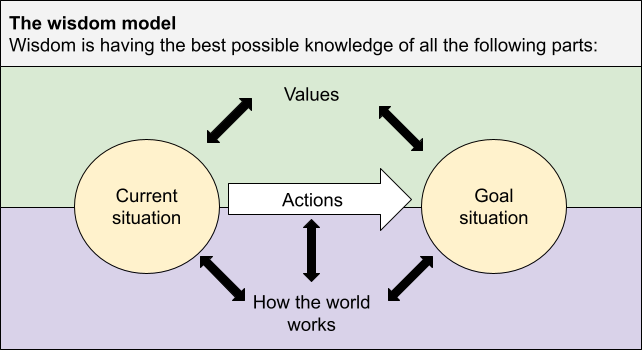The First Principles of Wisdom – Overview
The First Principles of Wisdom – Overview
The goal of A Wiser World is to help people become wiser. And the method for doing so is by finding the first principles of each topic. We must then start with the topic of “wisdom” itself. What is wisdom? And what are the fundamental laws or facts about wisdom that allow us to understand it at its core, and guide us on our quest to increase the wisdom in our world?
We begin by looking at the question of what wisdom is, then at how we acquire wisdom. After that we also take a look at what is necessary in order to teach wisdom. Finally, we look at what this all means for the project of A Wiser World. What is presented here is version 1.0 of the first principles of wisdom. With the help of the global community, these principles can be reviewed and improved so that we can be more certain that we have found the first principles of this topic.
What is Wisdom?
We explore this question by looking at different parts, one at a time.
First: Defining Information, Knowledge and Wisdom
Summary:
We define information, knowledge and wisdom in the following way:
Information is any observation or idea, whether true or false
Knowledge is the integration of several pieces of true information
Wisdom is knowledge that allows us to lead a good life
Second: What does it mean to lead a good life?
Summary:
As a next step we try to understand from first principles what “leading a good life” means. We arrive at the following definition: Leading a good life is when the actions we perform brings about situations that are in accordance with our values.
Third: A first principles framework of wisdom
We then arrive at a first principles framework of wisdom, presented in the following way:

Fourth: Reasoning from First Principles
In order to understand better what first principles are, we investigate different types of reasoning. We conclude that there is
-Logical reasoning, and
-Analogical reasoning
We further explain that reasoning from first principles is a type of logical reasoning, but has the advantages of being more secure in the conclusions we can draw.
How Do We Acquire Wisdom?
Article: How Do We Acquire Wisdom?
Summary:
First we establish “The knowledge method”, which involves following these steps:
- Observation: Make some observations. You could either just use your senses, or you could use some tools that would help you make more accurate observations.
- Comparison: Compare the observations against your expectations. Were you surprised by the observations? If so, was that because you had no expectations and simply experienced it as new information? Or did the observations contradict your expectations? If so, what were your expectations, and in what way did your expectations differ?
- Hypothesis: Come up with a hypothesis, or revise an old hypothesis. How would you explain the observations? Why do you think you observed the things you observed? Are there several possible explanations? Could it even be that the observation was a mistake, that it was an accidental event that isn’t normally the case?
- Predictions: Make predictions from your hypothesis. How could you test your hypotheses to see if they are correct? Or if you have several hypotheses: to test which of them seems to be the most correct one? What action or observation could you perform? What would the hypotheses predict would happen if that action was performed?
- Action: Carry out the test to produce observations that can show whether things are as the hypothesis predicted or not.
And then repeat the cycle.
In order to find wisdom, we should try to formulate as general hypotheses as possible. This gives us the chance to find the first principles.
How Do We Teach Wisdom?
Article: Teaching Wisdom
Summary:
In order to teach wisdom we need to make sure of the following:
- Are the ideas accurately understood or learnt?
- Is the person able to apply them in their life?
- Does the application of these ideas make their life and society better?
This requires being transparent about the sources, engaging in dialogue where we can receive feedback on what we try to communicate, express ourselves in ways that connect the ideas to real life, and study the long-term effect of people’s lives when they apply the ideas.
We also make sure that people have access to the ideas we want to teach.
What the First Principles of Wisdom Mean for A Wiser World
Article: What the First Principles of Wisdom Mean for A Wiser World
Summary:
The goal of A Wiser World
The overarching goal for the project is to find and teach wisdom, such that people can have good lives. To the extent that there are general truths that apply to most if not all people, the task of A Wiser World is to find these truths and teach them. In particular, the goal is to find the first principles, since they are the fundamental most general facts.
How to achieve the goal
–Use the knowledge method (OCHPA)
–Use the help of others
–Make sure that as many people as possible have access
–Be transparent about the sources and the reasoning behind the ideas
–Allow people to give feedback
–Investigate whether people can apply the ideas in their lives and make their lives and societies better
Page-ID: 15
This page is version 1.0. It has not yet been reviewed by the global community. Do you want to help improve it? Please leave a comment in the google document for this page, or join the email group to be part of the discussion. You can always share your thoughts via email directly to mail@awiserworld.net. Read more about how you can support A Wiser World.